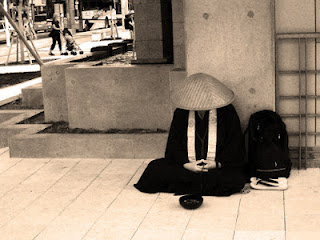Freedom Finds us When We Pause
“Temporary nirvana.”
 We may pause at seeing the new
green in spring; or in the supermarket we may pause to gaze at the freshness of
an infant’s face. When we finally understand a problem we’ve been grappling
with, our pause may be a sigh as our body and mind relax. At the end of a long
day, we may experience a natural pause when we lie down in bed and let
everything go.
We may pause at seeing the new
green in spring; or in the supermarket we may pause to gaze at the freshness of
an infant’s face. When we finally understand a problem we’ve been grappling
with, our pause may be a sigh as our body and mind relax. At the end of a long
day, we may experience a natural pause when we lie down in bed and let
everything go.
This is
how contemporary Thai Buddhist teacher Ajahan Buddhadasa describes the precious
interludes between all our “doing;” those times when we pause, and are not
grasping after our experience, or resisting it. He writes that without such
moments of inner freedom, “… living things would either die or become insane.
Instead, we survive because there are natural periods of coolness, of wholeness
and ease. In fact, they last longer than the fires of our grasping and fear. It
is this that sustains us.”
We incline ourselves toward
this healing freedom by practicing to pause again and again. At the very moment
when we’re about to lash out in verbal outrage, we can stop. When we feel
anxious, instead of turning on the TV or making a phone call or mentally
obsessing, we can sit still and feel our discomfort or restlessness. In this
pause we can let go of thinking and doing, and we become intimate with what is
happening in our body, heart and mind.
Pausing as a technique may
feel unfamiliar, awkward or at odds with our usual way of living. But actually
there are many moments—showering, walking, driving—when we release our
preoccupations and are simply aware and letting life be.
 We may pause at seeing the new
green in spring; or in the supermarket we may pause to gaze at the freshness of
an infant’s face. When we finally understand a problem we’ve been grappling
with, our pause may be a sigh as our body and mind relax. At the end of a long
day, we may experience a natural pause when we lie down in bed and let
everything go.
We may pause at seeing the new
green in spring; or in the supermarket we may pause to gaze at the freshness of
an infant’s face. When we finally understand a problem we’ve been grappling
with, our pause may be a sigh as our body and mind relax. At the end of a long
day, we may experience a natural pause when we lie down in bed and let
everything go.
We can also purposefully pause
during regular activities. I often pause before getting out of my car and
simply feel what is going on inside me. Sometimes after I hang up the phone,
I’ll just sit at my desk, breathing, listening, not doing the next thing. Or I
might stop cleaning the house for a moment and simply listen to the music I’d
put on to keep myself company. We can choose to pause on the top of a mountain or in a subway, while
we are with others or meditating alone.
The pauses in our life make
our experience full and meaningful. The well-known pianist Arthur Rubinstein
was once asked, “How do you handle the notes as well as you do?” His response
was immediate and passionate, “I handle notes no better than many others, but
the pauses—ah! That is where the art resides.”
Like a rest note in a musical
score, the pure stillness of a pause forms the background that lets the
foreground take shape with clarity and freshness. The moment that arises out of
the pause can, like the well-sounded note, reflect the genuineness, the
wholeness, the truth of who we are.
Pausing
is also the gateway to Radical Acceptance. In the midst of a pause, we are
giving room and attention to the life that is always streaming through us, the
life that is habitually overlooked. It is in this rest that we realize the
natural freedom of our heart and awareness. This is not something we need to
look for; it’s right here. We need only commit ourselves to arriving, here and
now, with wholehearted presence—and it naturally finds us.
From Radical Acceptance (2003)
For more information go to: www.tarabrach.com


